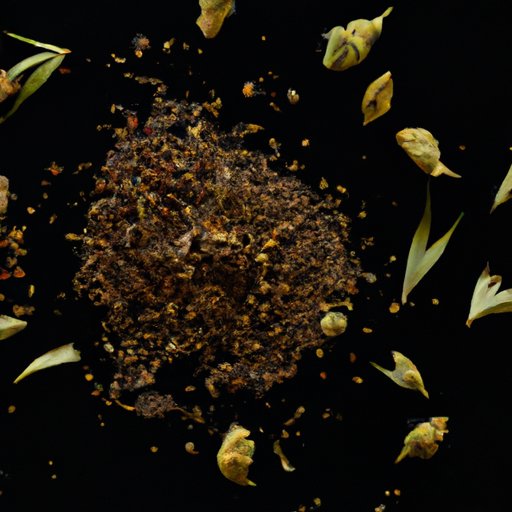
Introduction
If you’re familiar with cannabis, you may have heard of the term “greening out”. It’s a phenomenon that can happen when you consume too much cannabis, leading to uncomfortable physical and mental symptoms. Greening out can happen to anyone, regardless of their experience level or tolerance to cannabis. As such, it’s important to understand the effects, causes, and risks of greening out to ensure a safe and enjoyable experience.
Greening Out: Understanding the Effects and Causes
Greening out is characterized by a range of symptoms, such as dizziness, nausea, vomiting, panic attacks, and paranoia. Often accompanied by a sense of disorientation or a feeling of being trapped, greening out can be a scary and uncomfortable experience. While its symptoms can vary, the common denominator is usually overconsumption of THC, or tetrahydrocannabinol.
THC is the chemical responsible for the psychoactive effects of cannabis. It binds to receptors in the brain and central nervous system, altering perception, mood, and behavior. When THC levels are too high, the body can become overwhelmed, resulting in greening out. Factors such as individual tolerance levels, pre-existing medical conditions, and the method of consumption can all affect how THC affects a person.
While greening out is typically not dangerous, it’s important to be aware of its risks. People who have a history of anxiety and panic attacks should be especially cautious about consuming cannabis. Additionally, people who have consumed alcohol or other drugs should be careful not to overdo cannabis consumption, since it can exacerbate the effects of other substances and lead to unsafe situations.
Self-awareness and knowledge of your limits is key to avoiding greening out. Everyone’s tolerance is different, so starting with a low dose and gradually increasing over time is a good way to prevent overconsumption. Additionally, staying hydrated and consuming food along with cannabis can help mitigate the effects of greening out.
Is Green Out Dangerous? A Comprehensive Look at the Risks
While greening out is typically not dangerous, it can be a scary and uncomfortable experience. In addition to the physical symptoms, it can also lead to anxiety, panic attacks, and a sense of depersonalization. In some cases, individuals may experience a loss of consciousness or seizures. If any of these symptoms occur, it’s important to seek medical attention right away.
It’s also important to note that greening out is not unique to cannabis. Overconsumption or abuse of any substance can lead to negative effects, both physical and psychological. However, cannabis is generally a safe and non-lethal drug, especially when compared to substances such as alcohol and opioids.
Preventing Green Out: Tips for Responsible Cannabis Use
The best way to prevent greening out is through responsible cannabis use. This includes being aware of your limits, creating a safe and comfortable environment, and using dosage-control methods such as microdosing or keeping a journal. It’s also important to avoid peer pressure and recognize that everyone’s experience with cannabis is different.
Here are some tips for avoiding greening out:
- Start with a low dose and gradually increase over time
- Avoid mixing cannabis with other substances such as alcohol
- Stay hydrated and consume food along with cannabis
- Take a break if you start feeling uncomfortable or overwhelmed
Why Does Green Out Happen? Exploring the Science Behind the Phenomenon
The endocannabinoid system plays a major role in how cannabis affects the body and brain. This system is responsible for maintaining homeostasis and balance, and it regulates a range of physiological processes, including mood, appetite, and pain. When THC is consumed, it interacts with the endocannabinoid receptors, altering their activity and leading to a range of effects.
While THC is the primary psychoactive component of cannabis, other molecules such as CBD, terpenes, and flavonoids can also affect the experience and outcome of cannabis use. The entourage effect refers to the synergistic interplay between these molecules, and it can play a role in how THC affects the body.
My Personal Experience with Greening Out: Lessons Learned
Many people have experienced greening out at some point in their cannabis use journey. For some, it’s a one-time occurrence, while for others it may happen occasionally. While it can be a difficult experience, it can also be a learning opportunity.
Personally, I’ve experienced greening out a few times in my life. What I’ve learned is that communication with others is key. If I’m feeling uncomfortable or overwhelmed, it’s important to communicate that to my friends or loved ones. Additionally, self-care is crucial. Taking a break, taking a walk, or engaging in relaxing activities can help ease the symptoms of greening out.
Helping a Friend Who’s Greened Out: Dos and Don’ts
If you’re with someone who has greened out, it’s important to remain calm and supportive. Avoid criticizing or making fun of the person, and instead provide empathy and reassurance.
Here are some dos and don’ts for helping someone who has greened out:
- Do: Stay calm and offer reassurance
- Do: Encourage the person to take a break, drink water, or eat something
- Do: Offer to call for medical help if necessary
- Don’t: Criticize or blame the person
- Don’t: Force the person to consume more cannabis
- Don’t: Give the person alcohol, as it can exacerbate the effects of cannabis
Conclusion
Greening out is a phenomenon that can happen to anyone who consumes cannabis. It’s important to understand the causes and risks of green out, as well as tips for responsible use and prevention. Self-awareness, individual tolerance, and creating a safe and comfortable environment are key to avoiding greening out. Remember, the goal of cannabis consumption should be a safe and enjoyable experience for all.





